A Point of View: Isis and what it means to be modern
- Published
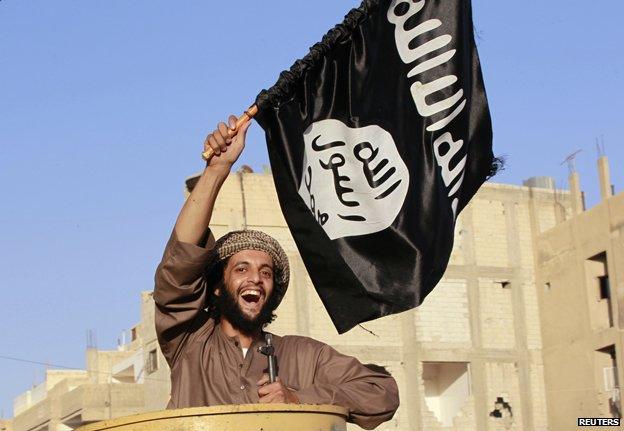
Although it claims to be reviving a traditional Islamic system of government, the jihadist group Isis is a very modern proposition, writes John Gray.
When you see the leader of Isis, Abu Bakr Al-Baghdadi, in Mosul announcing the creation of a caliphate - an Islamic state ruled by a religious leader - it's easy to think that what you're watching is a march back into the past. The horrifying savagery with which the jihadist organisation treats anyone that stands in its way seems to come from a bygone era. The fact that Isis - the Islamic State in Iraq and the Levant, which has now changed its name to the Islamic State - claims that it wants to restore an early type of Islam, leads many of us to see it as trying to bring about a reversion to mediaeval values.
To my mind, this gives too much credence to the way Isis views itself. There's actually little in common between the horribly repressive regime it has established in parts of Iraq and Syria and the subtle Islamic states of mediaeval times, which in Spain, for example, exercised a degree of tolerance at a time when the rest of Europe was wracked by persecution. Destroying ancient shrines and mosques, Isis is trying to eradicate every trace of Islamic tradition. It's probably even more oppressive than the Taliban were in Afghanistan. In power, Isis resembles a 20th Century totalitarian state more than any type of traditional rule.
Surprising as it may sound, Isis is in many respects thoroughly modern. Like al-Qaeda before them, these jihadists have organised themselves as a highly efficient company. Initially funded by donations from wealthy supporters, they've rapidly expanded into a self-financing business. Through kidnapping and extortion, looting and selling antiquities, siphoning off oil in territories they conquer, seizing gold bullion and other assets from banks and acquiring large quantities of American military hardware in the course of their advance, Isis has become the wealthiest jihadist organisation in the world. According to some estimates, it's worth well over $2bn.
Isis uses this wealth to expand its popular base, providing public services and repairing damaged infrastructure in the areas it controls. Its use of social media is highly professional. On its websites it issues annual reports containing detailed accounts of its acquisitions and operations, including breakdowns of the bombings, assassinations and suicide missions it has carried out.
Isis makes effective use of the internet to broadcast the brutal manner with which it deals with anyone judged to be an enemy. Isis's savagery isn't impulsive. Everything suggests it's a strategy developed over a number of years. When it posts videos of people being beheaded or shot, Isis advances several of its goals - simultaneously inspiring dread in its enemies, teaching the communities it controls the dire consequences of departing from an exceptionally extreme interpretation of Islam and sowing chaos in the population as a whole. There's nothing mediaeval about this mix of ruthless business enterprise, well-publicised savagery and transnational organised crime. Dedicated to building a new society from scratch, Isis has more in common with modern revolutionary movements.
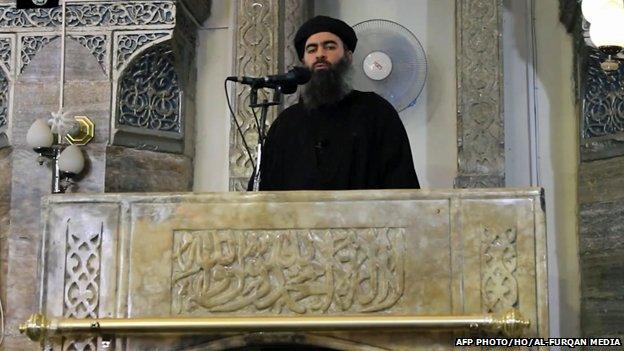
Abu Bakr Al-Baghdadi, pictured speaking in Mosul
Though al-Baghdadi constantly invokes the early history of Islam, the society he envisions has no precedent in history. It's much more like the impossible state of utopian harmony that western revolutionaries have projected into the future. Some of the thinkers who developed radical Islamist ideas are known to have been influenced by European anarchism and communism, especially by the idea that society can be reshaped by a merciless revolutionary vanguard using systematic violence. The French Jacobins and Lenin's Bolsheviks, the Khmer Rouge and the Red Guards all used terror as a way of cleansing humanity of what they regarded as moral corruption.
Isis shares more with this modern revolutionary tradition than any ancient form of Islamic rule. Though they'd hate to hear it, these violent jihadists owe the way they organise themselves and their utopian goals to the modern West. And it's not just ideas and methods that Isis has taken from the West. Western military intervention gave Isis its chance of power. While Saddam was in charge, there were no jihadist movements operating in Iraq - none at all. With all the crimes Saddam's dictatorship committed, it was a regime that applied secular law and had made some steps towards emancipating women.
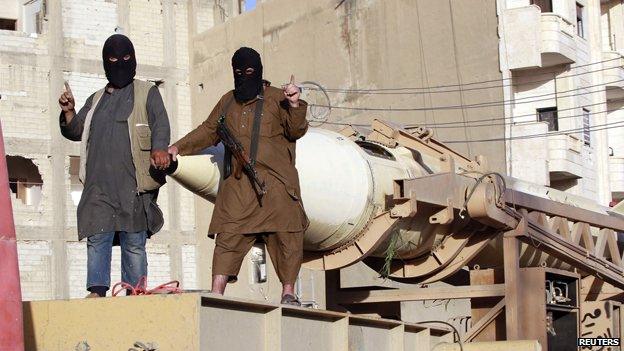
Islamist fighters in the Syrian province of Raqqa celebrate the declaration of the caliphate
In my view, toppling Saddam was bound to unravel this secular state and the Iraqi state itself. Even if the American-led occupiers hadn't made the mistake of disbanding the army and dissolving the ruling party, the country would eventually have broken up. Iraq was constructed from provinces of the former Ottoman Empire by the British in the 1920s, with the Sunni minority being the ruling group. The Sunnis had ruled since 1638, when the Ottomans took Baghdad from the Persians. The Kurds, who were included in the new state because the British prized the oil resources in the north of the country, were sure to take any opportunity to seize independence. Whatever the failings of the Maliki government, the idea that a stable federal system could develop in these circumstances has always been far-fetched. As some of those who opposed the war from the start foresaw, regime change created many of the conditions for a failed state. These are the same conditions that have allowed Isis to emerge and thrive.
It's sometimes suggested that ideology played no real part in the invasion of Iraq - grabbing the country's oil was what it was all about. No doubt geopolitical calculation played a part, but I think an idea of what it means to be modern was more important. The politicians and opinion-formers who clamoured for the invasion believed that all modern societies are evolving towards a single form of government - the type that exists in western countries. If only tyranny was swept away in Iraq, the country would move towards democracy and the rest of the Middle East would follow. Until just a few months ago, some were convinced that a similar process could take place in Syria.
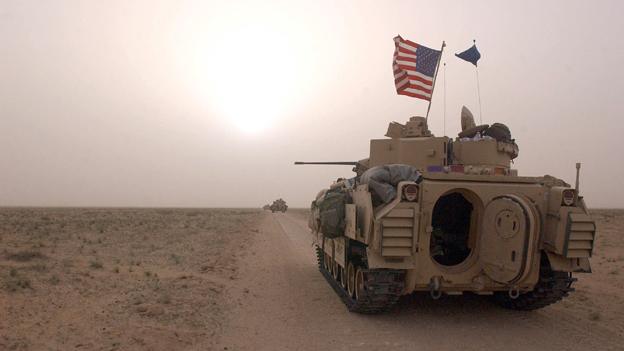
US tanks on Iraq border, 2003: "Regime change created many of the conditions for a failed state"
As I see it, this has never been more than an ideological fantasy. The modern world isn't evolving in any single direction. Liberal democracy is only one of several possible destinations. With its delusional ambitions (which, if we are to believe recent statements, include reconquering Spain) Isis illustrates a darker aspect of the modern world - the practice of using terror and violence in an attempt to achieve impossible goals.
Isis may have already over-reached itself. It's facing determined opposition from many sides - not just from Shia militias but also rival Sunni jihadists such as Al Qaeda, from which it's an offshoot. There are conflicting interests among the disparate elements Isis has recently recruited, and it's not clear that it can govern a state on any long-term basis. Moreover, Baghdadi's claim to speak for all Muslims is dismissed by Islamic scholars and rejected as absurd by practically the entire Muslim world. Even so, Isis poses a real danger - and not just in the Middle East.

Caliphate
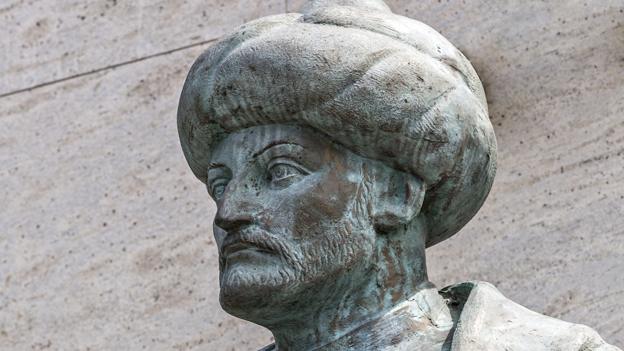
Statue of Suleiman the Magnificent, Istanbul
Name given to Islamic state led by supreme religious and political leader known as caliph, or successor to the Prophet Muhammad
Succession of Muslim empires described as "caliphates"; most famous is Ottoman caliphate or empire (1453-1924)
Centring on power of Turkish sultans, Ottoman Caliphate expanded to cover the Balkans and Hungary under Suleiman the Magnicient in 16th Century, and reached gates of Vienna
Turkish leader Kemal Ataturk abolished Ottoman Caliphate in 1924 and exiled the last caliph, Abdulmecid

It's hard for anyone to estimate in precise terms the scale of the threat Isis poses to countries such as Britain. Its main targets are in the Middle East. Still, there must be a danger that Western citizens who have gone to Syria and Iraq as Isis fighters will return battle-hardened and with new bomb-making skills. Also, Isis has now declared war not only on the west but also on al-Qaeda. In these circumstances there may be an increased risk that one or other of these groups will be tempted to stage a spectacular act of terror in order to secure a position of leadership in the global jihadist struggle.
Through their policies of regime change, Western governments have pursued an ideological vision that leaves out the dark side of the modern world. In doing so, they've unwittingly let loose a particularly nasty version of modern savagery. Whatever happens to the self-styled caliphate, the forces it embodies aren't going to fade away. Isis is a part of the revolutionary turmoil of modern times, and until we grasp that uncomfortable fact we won't be able to deal with the dangers we face.
A Point of View is broadcast on Fridays on Radio 4 at 20:50 BST and repeated Sundays 08:50 BST- or listen on BBC iPlayer
Subscribe to the BBC News Magazine's email newsletter to get articles sent to your inbox.